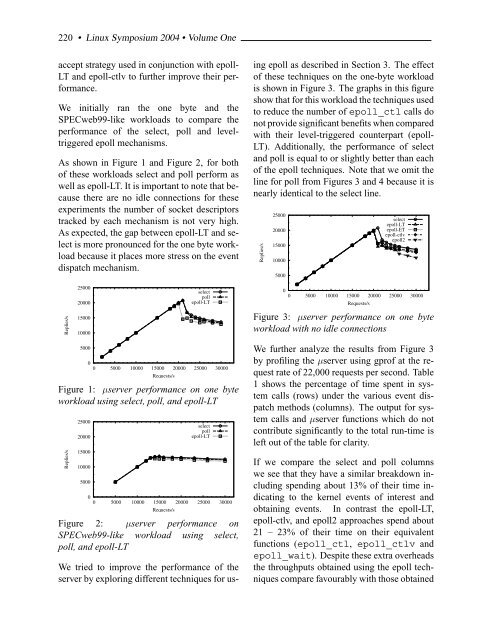You also want an ePaper? Increase the reach of your titles
YUMPU automatically turns print PDFs into web optimized ePapers that Google loves.
220 • <strong>Linux</strong> Symposium 2004 • Volume <strong>One</strong><br />
accept strategy used in conjunction with epoll-<br />
LT and epoll-ctlv to further improve their performance.<br />
We initially ran the one byte and the<br />
SPECweb99-like workloads to compare the<br />
performance of the select, poll and leveltriggered<br />
epoll mechanisms.<br />
As shown in Figure 1 and Figure 2, for both<br />
of these workloads select and poll perform as<br />
well as epoll-LT. It is important to note that because<br />
there are no idle connections for these<br />
experiments the number of socket descriptors<br />
tracked by each mechanism is not very high.<br />
As expected, the gap between epoll-LT and select<br />
is more pronounced for the one byte workload<br />
because it places more stress on the event<br />
dispatch mechanism.<br />
We tried to improve the performance of the<br />
server by exploring different techniques for using<br />
epoll as described in Section 3. <strong>The</strong> effect<br />
of these techniques on the one-byte workload<br />
is shown in Figure 3. <strong>The</strong> graphs in this figure<br />
show that for this workload the techniques used<br />
to reduce the number of epoll_ctl calls do<br />
not provide significant benefits when compared<br />
with their level-triggered counterpart (epoll-<br />
LT). Additionally, the performance of select<br />
and poll is equal to or slightly better than each<br />
of the epoll techniques. Note that we omit the<br />
line for poll from Figures 3 and 4 because it is<br />
nearly identical to the select line.<br />
Replies/s<br />
25000<br />
20000<br />
15000<br />
10000<br />
5000<br />
select<br />
epoll-LT<br />
epoll-ET<br />
epoll-ctlv<br />
epoll2<br />
Replies/s<br />
25000<br />
20000<br />
15000<br />
10000<br />
select<br />
poll<br />
epoll-LT<br />
0<br />
0 5000 10000 15000 20000 25000 30000<br />
Requests/s<br />
Figure 3: µserver performance on one byte<br />
workload with no idle connections<br />
5000<br />
0<br />
0 5000 10000 15000 20000 25000 30000<br />
Requests/s<br />
Figure 1: µserver performance on one byte<br />
workload using select, poll, and epoll-LT<br />
Replies/s<br />
25000<br />
20000<br />
15000<br />
10000<br />
5000<br />
0<br />
0 5000 10000 15000 20000 25000 30000<br />
Requests/s<br />
select<br />
poll<br />
epoll-LT<br />
Figure 2: µserver performance on<br />
SPECweb99-like workload using select,<br />
poll, and epoll-LT<br />
We further analyze the results from Figure 3<br />
by profiling the µserver using gprof at the request<br />
rate of 22,000 requests per second. Table<br />
1 shows the percentage of time spent in system<br />
calls (rows) under the various event dispatch<br />
methods (columns). <strong>The</strong> output for system<br />
calls and µserver functions which do not<br />
contribute significantly to the total run-time is<br />
left out of the table for clarity.<br />
If we compare the select and poll columns<br />
we see that they have a similar breakdown including<br />
spending about 13% of their time indicating<br />
to the kernel events of interest and<br />
obtaining events. In contrast the epoll-LT,<br />
epoll-ctlv, and epoll2 approaches spend about<br />
21 – 23% of their time on their equivalent<br />
functions (epoll_ctl, epoll_ctlv and<br />
epoll_wait). Despite these extra overheads<br />
the throughputs obtained using the epoll techniques<br />
compare favourably with those obtained

















